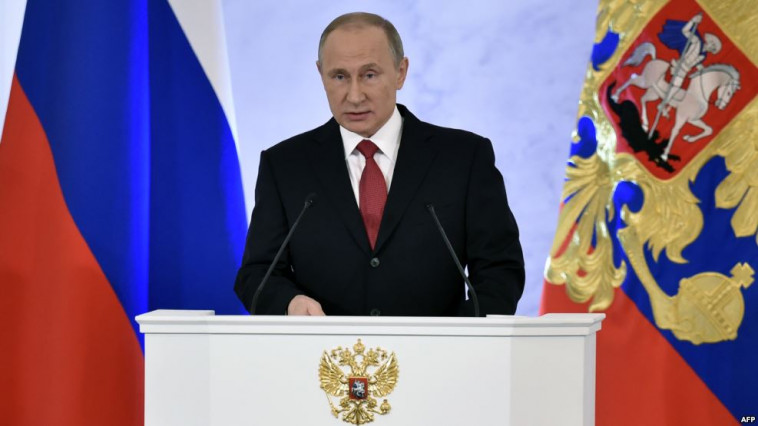Vladimir Putin's annual State of the Nation Address

President Vladimir Putin delivered his annual State of the Nation Address to the Federal Assembly on December 1. Russian president’s speech shined the spotlight on the country’s domestic development. The Address is an annual event and is traditionally delivered at the Kremlin’s St George Hall where the president gives his speech to members of both houses of the parliament.
In his annual state-of-the-nation address, Russian President Vladimir Putin has said that the country is unified like never before and is fully capable of achieving its strategic economic and geopolitical goals.
Although the speech was predominantly about domestic priorities, Putin several times spoke of pressure from outside forces, including the economic sanctions introduced by the United States, European Union, and other countries over Russia's 2014 annexation of Ukraine's Crimea region and Moscow's military support for separatists in eastern Ukraine.
Putin said the sanctions imposed by the West were an "attempt to make us dance their dance, as people say, and to neglect our national interests."
"All instruments have been used, from myths about Russian aggression and propaganda to the persecution of our Olympic athletes," Putin said, referring to a major scandal this year that saw many Russian athletes barred from competing in the Summer Olympics in Brazil after a World Anti-Doping Agency report accused Russia of implementing an extensive state-sponsored doping program.
"There have been targeted disinformation campaigns, propaganda, and attempts to mentor us - we are tired of it all," Putin said. "But we are ready to take part in the solution of global problems. We do not seek confrontation with anyone. We are not looking for enemies. We need friends."
Putin mentioned what he indicated was an opportunity for improved relations with the United States presented by the election of Donald Trump as president. He said Moscow is ready to cooperate with the United States to combat international terrorism, which he described as a "real, not fictional" threat.
He also said that Russia's relations with China were a "stabilizing factor" in global and regional politics, and are based on "harmony" rather than the idea of "domination" of the world stage by any particular country - an apparent reference to the United States.
He did not mention Ukraine or any other former Soviet countries and only obliquely referred to the civil war in Syria.
He ordered the government of Prime Minister Dmitry Medvedev to develop a strategic plan for bolstering Russia's place in the global economy through 2025.
Moscow-based political analyst Aleksandr Kynev said on Facebook that Putin's speech was the "quietest, tamest, calmest, most peaceable" of his state-of-the-nation addresses.
On Twitter, social activist Alyona Popova wryly suggested that the Russia that Putin described in the address was largely imaginary.
Opposition politician and anticorruption activist Aleksei Navalny was more unequivocal. He said Putin's speech "was completely empty and consisted either of flat-out lies about 'successes' or the same promises we have had for the last 17 years."
Source: Radio Free Europe/Radio Liberty














